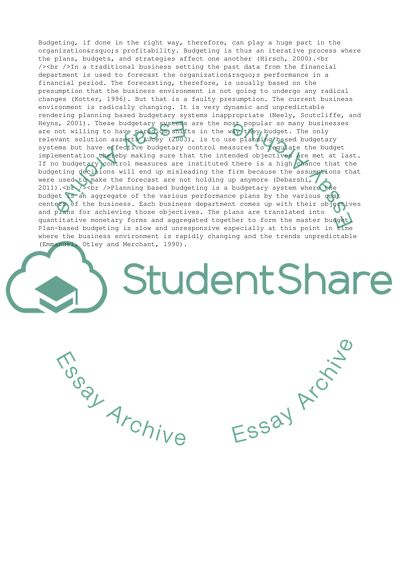Cite this document
(Effectiveness of Budgetary Control Coursework Example | Topics and Well Written Essays - 1500 words, n.d.)
Effectiveness of Budgetary Control Coursework Example | Topics and Well Written Essays - 1500 words. https://studentshare.org/management/1811129-critically-discuss-the-effectiveness-of-budgetary-control-in-unpredictable-and-dynamic-environments-your-discussion-should-highlight-potential-solutions-that-might-be-deployed-where-planning-based-systems-fail
Effectiveness of Budgetary Control Coursework Example | Topics and Well Written Essays - 1500 words. https://studentshare.org/management/1811129-critically-discuss-the-effectiveness-of-budgetary-control-in-unpredictable-and-dynamic-environments-your-discussion-should-highlight-potential-solutions-that-might-be-deployed-where-planning-based-systems-fail
(Effectiveness of Budgetary Control Coursework Example | Topics and Well Written Essays - 1500 Words)
Effectiveness of Budgetary Control Coursework Example | Topics and Well Written Essays - 1500 Words. https://studentshare.org/management/1811129-critically-discuss-the-effectiveness-of-budgetary-control-in-unpredictable-and-dynamic-environments-your-discussion-should-highlight-potential-solutions-that-might-be-deployed-where-planning-based-systems-fail.
Effectiveness of Budgetary Control Coursework Example | Topics and Well Written Essays - 1500 Words. https://studentshare.org/management/1811129-critically-discuss-the-effectiveness-of-budgetary-control-in-unpredictable-and-dynamic-environments-your-discussion-should-highlight-potential-solutions-that-might-be-deployed-where-planning-based-systems-fail.
“Effectiveness of Budgetary Control Coursework Example | Topics and Well Written Essays - 1500 Words”. https://studentshare.org/management/1811129-critically-discuss-the-effectiveness-of-budgetary-control-in-unpredictable-and-dynamic-environments-your-discussion-should-highlight-potential-solutions-that-might-be-deployed-where-planning-based-systems-fail.


